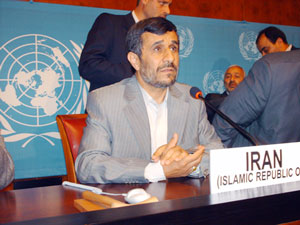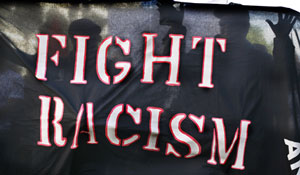Western anger doesn't derail anti-racism conference
By Ashahed M. MuhammadAssistant Editor | Last updated: Apr 26, 2009 - 10:04:15 PM
What's your opinion on this article?
‘Easier to be critical from afar'GENEVA, Switzerland (FinalCall.com) - The Durban Review Conference kicked off April 20 as United Nation member states and advocacy groups convened to honor victims of racism and discrimination and use their combined voices to speak out for human rights across the globe.

Iranian Pres. Mahmoud Ahmadinejad answers questions from reporters following his message to the General Assembly at the Durban Review
Conference. Photo: Ashahed M. Muhammad
|
“Following WWII they resorted to military aggression to make an entire nation homeless on the pretext of Jewish suffering,” said the Iranian president. “They sent migrants from Europe, the United States and from other parts of the world, in order to establish a totally racist government in the occupied Palestinian lands and in fact, in compensation for the dire consequences of racism in Europe, they helped bring to power the most cruel and repressive racists in Palestine,” said the Iranian leader.
Protests erupted immediately and there were separate disruptions: Two people in rainbow clown wigs stood up screaming and were escorted out, while some members of Jewish organizations screamed at President Ahmadinejad, but his supporters shouted the critics down.
‘A New Direction'
“The time is now,” said UN Secretary-General Ban Ki-Moon. “This is the promise of a new day, a move in a new direction with all nations as one.” He also addressed the fact that key nations, the United States and Israel, chose to stay away from the conference. Some find it “easier to be critical from afar instead of becoming involved in the process,” said the secretary-general.
“Discrimination does not go away by itself. It must be challenged,” he added.

Protestors carry a banner reading “fight racism” as they take part in an anti-racism demonstration in the center of Geneva, Switzerland, April 18. The United Nations was bracing for a major anti-racism conference opening at its European headquarters. Photo: AP Wide World Photos
|
Glenroy Watson, secretary general of the Global Afrikan Congress, one of the conference observers, said he was looking for the United States to show leadership instead of staying away.
“The British usually follow the Americans,” said Mr. Watson. As a son of Africa, President Obama should be on the forefront of bringing the issue of reparations for the trans-Atlantic slave trade before the world stage, he said.
Amid controversy before the appearance by President Ahmadinejad, many representatives from UN member nations as well as non-governmental organizations hoped that his presence would not distract others from the purpose of the conference. Others looked forward to the opportunity to challenge him on some of the statements attributed to him in the media.
“I recently converted to Christianity from Islam, so I'm hoping that I can ask him a question,” said Saeed Fotohinia, of Youth Against Racism, a participating advocacy group. Mr. Fotohinia was a part of the 2001 World Conference Against Racism in Durban, South Africa as a youth delegate. Now at age 26, he said the 2001 conference had a key component aimed at the youth. In his view, the UN has not continued that emphasis and he will voice those concerns, hopefully in the organizational forums scheduled for the last two days of the conference.
“The review process isn't complete until the youth summit takes place, and the declaration and program of action we put together (in 2001) is revised and improved,” said Mr. Fotohinia.
“We must concentrate on contemporary forms of racism that still exist, as well as the trans-Atlantic slave trade including compensation for the victims,” said Murad Hamaima, deputy director of international organizations for the Ministry of Foreign Affairs for the Libyan Arab Jamahiriya. “That issue is very important to us, as well as the Palestinian issue.”
Imad M. Zuhairi, deputy ambassador for Palestine to the United Nations, said any discussion of racism and discrimination must include a thorough discussion of the Zionist state's occupation, despite the fact that Israel chose not to participate.
“Occupation is the ugliest form of racism and if you observe what the occupying power Israel is performing in the territories for 61 years, it is a systematic and organized policy of racism and discrimination,” Mr. Zuhairi told The Final Call.
Citing Israeli actions such as construction of a “security” wall, the establishment of bypass roads used only by Israeli settlers, and destruction of homes to build Israeli parks, Mr. Zuhairi said the principles of the 2001 conference are still relevant and in need of full implementation in 2009.
“Reaffirming the Durban Declaration and program of action as it was written would be very important for us. What we are doing today is to look to the modalities and the procedures to implement that program of action,” said Mr. Zuhairi.
Related links:
Stand with us: Exploiting Darfur and Jewish teenagers (MuzzleWatch, 04-21-2009)
Pursuing equity requires systematic approach (FCN, 04-21-2009)
Durban Review Conference on Racism (Official Site)
INSIDE STORIES AND REVIEWS
-
-
About Harriett ... and the Negro Hollywood Road Show
By Rabiah Muhammad, Guest Columnist » Full Story -
Skepticism greets Jay-Z, NFL talk of inspiring change
By Bryan 18X Crawford and Richard B. Muhammad The Final Call Newspaper @TheFinalCall » Full Story -
The painful problem of Black girls and suicide
By Charlene Muhammad -National Correspondent- » Full Story -
Exploitation of Innocence - Report: Perceptions, policies hurting Black girls
By Charlene Muhammad -National Correspondent- » Full Story -
Big Ballin: Big ideas fuel a father’s Big Baller Brand and brash business sense
By Bryan Crawford -Contributing Writer- » Full Story






 Click Here Stay Connected!
Click Here Stay Connected!








